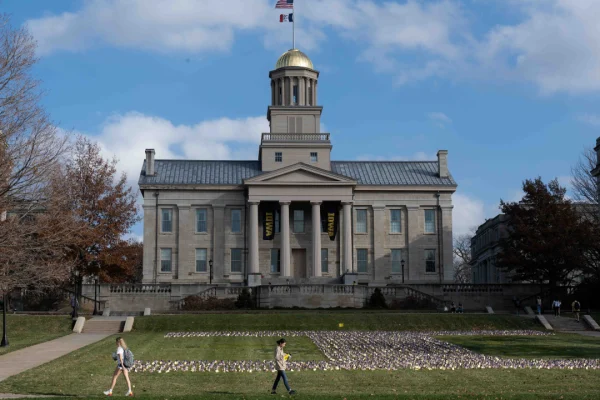A year ago, Sir Keir Starmer secured the largest election victory in the UK since 1997.
Labour won 411 seats and a 174-seat majority – and while Labour’s vote share across many constituencies dropped compared to national predictions, the UK was washed with red seats.
Yet as we reflect on Labour’s time in government to date, it’s fair to say the journey has not been smooth.
Starmer has already made several significant U-turns and has announced policy changes that haven’t landed well with voters – increases to national insurance contributions, reducing winter fuel payments and the “tractor tax”, to name a few.
As public trust in the government continues to decline and disapproval rates rise, we are continuing to see a swing of support over to Reform UK – including in constituencies with large student populations.
PLMR recently commissioned Electoral Calculus to conduct a new multi-level regression and post-stratification (MRP) poll to understand voting intentions and the current political attitudes of the public.
Conducted in June 2025 with a sample size of 5,400 individuals, the results show a significant change in student voting patterns and beg the question – is Labour losing the student vote?
Voting intentions
If a General Election was called tomorrow, our data currently places Reform UK with 31 per cent of the vote share ahead of Labour with 22 per cent and the Conservatives trailing with 19 per cent. Reform UK is predicted to win an outright majority, securing 377 seats and a majority of 104.
![]()
If a General Election was therefore called tomorrow, Nigel Farage would become the Prime Minister of the United Kingdom.
The data also shows changes in constituency MPs, including for ministers with responsibility for higher education like the Secretary of State for Education, Bridget Phillipson MP, according to the projections.
While the sector is not unaccustomed to experiencing regular and quick changes in political governance – with six university ministers being in post in the last five years alone – the data does point to wider challenges for HE and the student vote.
Reform the system
Last year, the Higher Education Policy Institute (HEPI) published a piece about whether students made a difference at the 2024 General Election – identifying the top twenty student constituencies and Labour’s vote share in these seats.
We have analysed our polling to understand how these constituencies would fare in an election if it were called tomorrow – the results from which show the changing state of voting intentions in these areas.
Of the twenty constituencies, over one-third (35 per cent) are predicted to move away from being Labour-held to either Reform or Green. This aligns with the national picture – voters are showing an ever-growing frustration with the current government and are therefore evolving their political affiliation.
![]()
When we look specifically at the data for 18-24-year-olds – acknowledging the experiences of those beyond this age group who are currently studying in UK higher education – we continue to see this pattern of voting behaviour.
For example, when asked who they would vote for if a General Election was called tomorrow, 24 per cent of 18-24-year-olds who indicated a likelihood to vote noted their intention to vote for Labour – with 23 per cent claiming they would vote for Reform UK and 21 per cent for the Green Party.
The Conservatives followed with 13 per cent, the Liberal Democrats with 10 per cent and Scottish National Party and Plaid Cymru with 1 per cent each.
Interestingly, when we then consider the likelihood of voting among 18-24-year-olds we see further frustration with the current political system.
For example, under half (41 per cent) of 18-24-year-olds responded that they would “definitely” vote in a General Election if it were called tomorrow, followed by 11 per cent who would be “very likely” to vote.
Yet 21 per cent responded that they would “definitely not” or are “unlikely” to vote, and 16 per cent were unsure. That reveals an almost even split in the likelihood of voting among 18-24-year-olds. For a traditionally politically mobile population, this raises concerns about young people’s faith and willingness to engage with an election.
Participants were then asked about the most important issues that will influence how they vote at the next General Election, with the top three issues for 18-24-year-olds being the cost of living and the economy (57 per cent), the National Health Service (NHS) waiting times, staffing and funding (45 per cent), and immigration and border control (25 per cent).
While these generally align with trends in all other age groups,
18-24-year-olds express greater concern for wider issues than other age cohorts. For example, 23 per cent of individuals in this age group reported being concerned about housing affordability and home ownership, 22 per cent about trust in politicians and government integrity, and 19 per cent about climate change and the environment.
While some in other age cohorts reported concerns in these areas, the proportion is highest among 18-24-year-olds.
![]()
So what does all of this tell us?
It’s clear that Labour isn’t sustaining the support it built up during the General Election campaign last year, despite securing such an historic electoral victory, and this is true especially in student-heavy constituencies – with many already indicating their interest in seeing an electoral change.
As economic challenges continue to create barriers within HE, with many institutions closing courses, implementing redundancy programmes and depending on international fees due to limited increases to domestic fees in line with inflation, government must be proactive in its engagement with the sector to recognise how challenges to the student experience can impact voter intention.
With a growing national swing towards Reform UK, Labour must become aware of the challenges facing student voters if it wants to change the projected course of action and secure a second term in office.
With lots of work to do ahead of 2029 – and only a year into this Parliament – student interests need to rise up the political agenda.










